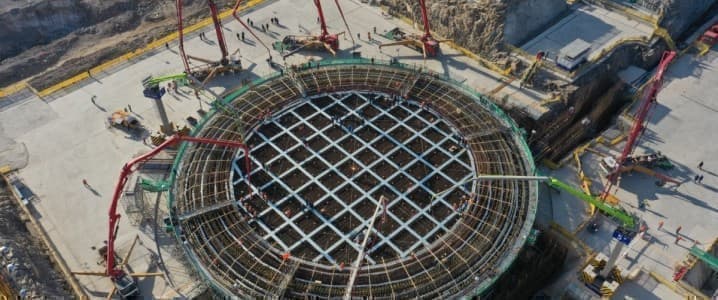The Shidaowan nuclear power plant, which features the world’s first fourth-generation reactor, started commercial operations on December 6, China National Nuclear Corporation (CNNC), one of the project’s developers, said.
“China’s independently developed high-temperature gas-cooled reactor demonstrator commenced commercial operation,” CNNC said in a statement.
“It signifies that China has completed the world’s first commercially operational modular nuclear power plant with fourth-generation nuclear technology, marking the transition of fourth-generation nuclear technology from experiments to the commercial market.”
Generation IV reactors are considered safer and more efficient.
“The tests confirmed that commercial-scale reactors could be cooled down naturally without emergency core cooling systems for the first time in the world. It is the so-called inherently safe reactor,” Tsinghua University, one of the joint developers of the reactor, said.
Such reactors can produce heat, electricity, and hydrogen and would help China and the world “become carbon neutral,” Zhang Zuoyi, dean of the Tsinghua University Institute of Nuclear and New Energy Technology and chief designer of the Shidaowan reactor project, told South China Morning Post.
The fourth-generation reactor in operation now puts China “ahead of other countries in terms of nuclear technology research and development,” Francois Morin, China director of industry group World Nuclear Association, told The Wall Street Journal.
According to Morin, Western countries are set to launch their fourth-generation nuclear reactors only in the early 2030s.
David Fishman, a China-based senior manager at energy consulting firm Lantau Group, told the Journal that “China is arguably peerless in actually building and commercializing next-generation nuclear power technology.”
Many countries in the West, with the notable exception of Germany, have recognized that nuclear power generation would help them achieve net-zero emission goals.
At the COP28 climate summit currently underway in Dubai, the United States and 21 other countries pledged to triple nuclear energy capacity by 2050, saying incorporating more nuclear power in their energy mix is critical for achieving their net zero goals in the coming decades.
The United States, alongside Britain, France, Canada, Sweden, South Korea, Ghana, and the United Arab Emirates (UAE), among others, signed the declaration at the COP28 climate summit.
“The Declaration recognizes the key role of nuclear energy in achieving global net-zero greenhouse gas emissions by 2050 and keeping the 1.5-degree Celsius goal within reach,” the U.S. Department of State said.
China is not a signatory to that declaration, but it aims to develop more nuclear energy capacities to reduce emissions as its demand for electricity rises. 
As of 2020, nuclear energy accounted for 5% of China’s generation mix, which continued to be dominated by coal, per data from the World Nuclear Association.
By 2035, nuclear energy is expected to make up 10% of the electricity generation mix and 18% by 2060, Chinese media quoted the China Nuclear Energy Association (CNEA) as saying earlier this year.
As of September 2023, China had 55 nuclear power units in operation with a combined installed capacity of 57 GW, and 24 units under construction with a total installed capacity of 27.8 GW, Xinhua quoted CNEA official Wang Binghua as saying. By 2060, that capacity is expected to jump to 400 GW, the official said.
China is also expected to approve six to eight nuclear power units each year “within the foreseeable future.”



I remember back in the late '00s when I was told HSR would be here in the '20s. This shit is never going to happen. We’re simply going to outsource everything to China and let them take care of it, while periodically waging our fists and insisting we’ll start a war with them if they don’t get in line.
I have a feeling that in China they somehow are able to push through the permitting issues and environmental reviews (if they have any) that have made new nuclear plants in the US at least so economically difficult that no one wants to back them. Just something about that system of governance that makes projects like this happen…can’t quite put my finger on it. Wait, you’re saying that they probably don’t have a million interested parties that can stop the project at any part of the development? Or maybe the dissent just…doesn’t matter?
https://pnhp.org/news/gilens-and-page-average-citizens-have-little-impact-on-public-policy/